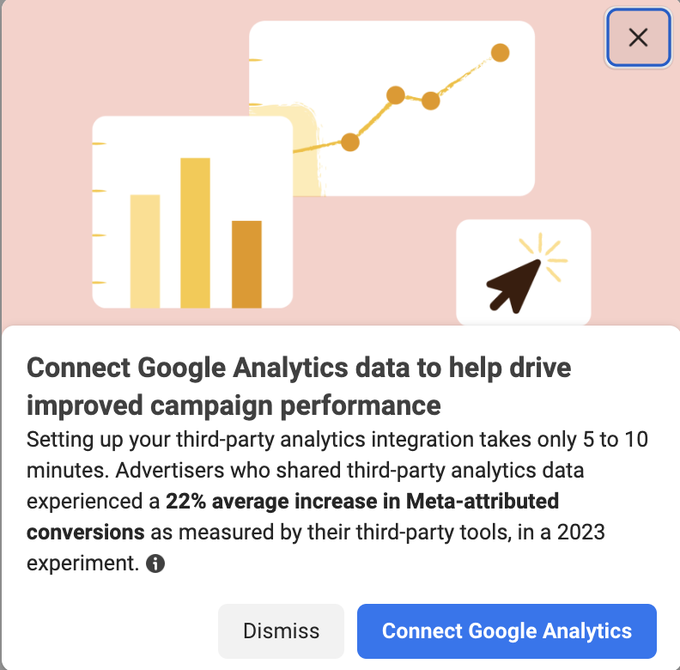Meta is set to implement a major overhaul in its approach to ad campaign measurement and optimisation, aimed at delivering more tailored results for advertisers.
Damian Wandler & Fred Leach, Product Management, Meta, August 2024
“Every business is unique in what they value most, which is why we offer different ways for them to optimize campaigns. For example, some businesses want to maximize total conversions, while others want to increase the value of every conversion.
Understanding exactly what a business values allows us to bring a level of customization to each of their ad campaigns, which is integral to making sure our AI models and automation solutions continue to maximize every dollar spent.”
Reflecting a broader strategy to leverage AI-driven automation, Meta is offering businesses a more customised advertising experience. These updates are poised to redefine how advertisers interact with Meta’s platform, enabling better alignment of ad performance with specific business objectives.
Breaking Down Barriers with Third-Party Analytics Integration
One of the most significant updates is the improved integration of third-party analytics tools, such as Google Analytics and Northbeam, directly into Meta’s Ads Manager.
The integration allows advertisers to share aggregated campaign data, providing Meta with deeper insights into how its ads contribute to conversions relative to other channels. In turn, advertisers will benefit from more precise ad targeting and better alignment with broader marketing strategies.
The importance of this integration lies in its potential to dismantle the traditional “walled garden” approach that Meta has often been criticised for.
By embracing external analytics tools, Meta enables advertisers to gain a more comprehensive view of their campaign performance, which could lead to better-informed decision-making. Advertisers who have already tested this integration have reported a 30% increase in Meta-attributed conversions, highlighting the potential benefits of these enhancements.
Reimagining Value with Conversion Rules
Meta is introducing a new feature called “Conversion Value Rules,” allowing advertisers to assign different values to various customer segments without the need to create separate campaigns. Offering a more efficient way to optimise ad spend, this feature focuses on high-value customers, potentially driving better return on investment (ROI).
Previously, advertisers needed to manually segment their audiences and create distinct campaigns for different customer groups. Conversion Value Rules streamline this process, enabling greater automation while maintaining or even enhancing campaign performance. For example, an advertiser who identifies that a particular customer segment has a 30% higher lifetime value can set a higher bid for that segment without complicating their campaign structure. Early tests of this feature have shown a 20% improvement in quality conversions, making it a promising tool for advertisers looking to maximise the impact of their ad spend.
Unlocking the Power of Incremental Conversions
Another key update is the introduction of a new attribution model focused on incremental conversions—those conversions that would not have occurred without the ad being shown. This contrasts with traditional optimisation models that focus on maximising the total number of attributed conversions. By honing in on incremental conversions, Meta aims to provide a clearer picture of how its ads are truly driving value.
Tests conducted earlier this year showed a 20% improvement in incremental conversions with this new model, suggesting a potential game-changer for advertisers. Optimising for these specific conversion events allows businesses to better understand the direct impact of their Meta ads, leading to more effective and efficient ad campaigns.
AI-Driven Ad System: The Future of Precision Targeting
Meta’s overarching goal with these updates is to enhance its ad system using AI and integrated analytics. By connecting more deeply with external data sources, Meta’s AI models can better understand what businesses value most and adjust ad targeting accordingly. Expected improvements include an increase in the overall value of conversions delivered by Meta’s platform, making its ad system more responsive and effective.
As these updates are gradually introduced, advertisers should see improvements not only in conversion volume but also in the quality and relevance of the conversions attributed to Meta’s ads. A more significant return on investment could be on the horizon for businesses that effectively leverage these new tools and features.
The Road Ahead: Navigating Meta’s New Ad Landscape
These updates mark a notable shift in how Meta approaches ad campaign optimisation. Making its platform more adaptable to individual business needs and integrating with widely used third-party analytics tools positions Meta as a more flexible and effective advertising partner. Advertisers can expect greater control over campaign optimisation, potentially leading to better performance and more valuable insights.
The real test, however, will be in how these changes perform in practice. While early reports are promising, businesses will need to monitor their campaigns carefully and adjust their strategies as necessary to fully capitalise on these new opportunities. As Meta continues to refine its ad system, advertisers who stay ahead of these changes will likely reap the most significant rewards.




RECOMMENDED FOR YOU
WhatsApp Ads Finally Launch
Meta has launched a major monetisation push for WhatsApp,…
Meta has launched a major monetisation push for WhatsApp,…
Meta Expands Opportunity Score Globally
Meta is expanding the availability of Opportunity Score in…
Meta is expanding the availability of Opportunity Score in…
LinkedIn Expands Video Ads With First Impression and BrandLink Formats
LinkedIn is deepening its focus on video, positioning itself…
LinkedIn is deepening its focus on video, positioning itself…